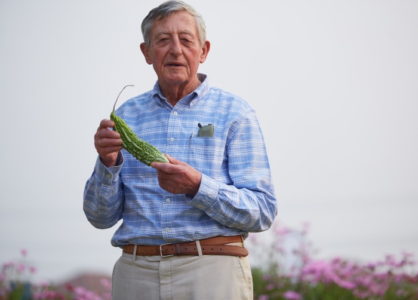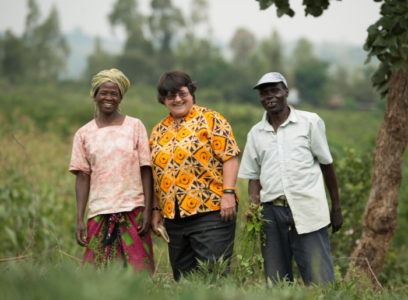
You can’t save the world just by producing improved seeds for nutritious crops; you need to create an enabling environment so more people begin to grow and eat them. This was the consensus shared by 2019 World Food Prize Laureate Simon Groot and Jan Low, one of the four 2016 Laureates.
Speaking at a World Food Prize breakout session called ‘Farmers, food and the future: vegetable seeds for a healthier world’, Low said, “I think we’re all learning the same lessons.”
“The International Potato Center didn’t start to really make progress with orange-fleshed sweetpotato until we began breeding in Africa for Africa, because the African environment is incredibly diverse and difficult, and I think it is the same for vegetables.”
Low observed that East-West Seed, which Groot founded to promote the cultivation of vegetables in Asia, and the International Potato Center (CIP) share common goals and approaches in their dissemination of quality seed for nutritious crop varieties, providing opportunities for knowledge sharing and other collaboration.
She and CIP scientists Maria Andrade and Robert Mwanga were awarded the 2016 World Food Prize for their contributions to an initiative that has gotten nutritious orange-fleshed sweetpotato (OFSP) varieties to almost 6 million African families. She has worked with an array of partners to raise awareness of OFSP’s capacity to reduce vitamin A deficiency – which is responsible for a host of ailments – and create enabling environments for its cultivation and consumption in 16 African countries.
Groot, who is a fourth generation Dutch vegetable seed producer, started East-West Seed in the Philippines after his family company was sold in 1981. He began by breeding locally adapted hybrid varieties of popular vegetables and subsequently set up a field-training program – in collaboration with international and local organizations – to help smallholder farmers harness the full potential of those seeds. East-West Seed now supplies farmers in 60 countries while its knowledge transfer program trains almost 100,000 smallholders in eight Asian and Africa countries. Its combination of breeding, seed production and knowledge transfer has much in common with CIP’s approach to improving food and nutrition security and incomes, even though farmers plant vegetative seed (tubers or vine cuttings) for potato and sweetpotato, as opposed to the botanical seed of other vegetables. Both CIP and East-West Seed use demonstration plots, distribute training manuals in local languages, and raise awareness of the crops they promote.

CIP’s sweetpotato work includes breeding nutritious varieties, expanding the supply and distribution of quality planting material, training farmers in good practices, and testing options for extending the crop’s shelf life. The seasonality of harvests and challenges of conserving sweetpotatoes in rural Africa limits the availability of nutritious OFSP.
“I’m really excited about the post harvest investments that we can make jointly with the vegetable sector, because a lot of the issues are the same for these crops,” Low enthused. “There are real challenges on the post harvest side that are shared by sweetpotato and other vegetables, and we need to overcome them to get these crops to more people.”
“I think there are great lessons to be learned between programs, and that working together can help us meet our objective of getting more nutritious food to the people who need it most,” she said.
